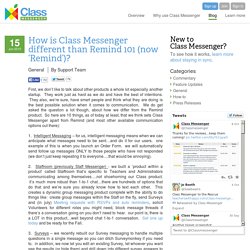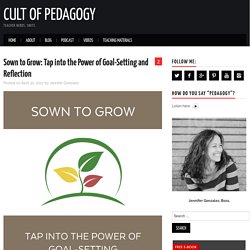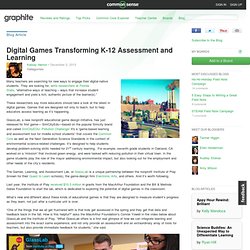

The Institute for Arts Integration and STEAM. Make Your Images Interactive - ThingLink. How is Class Messenger different than Remind 101 (now ‘Remind’)? First, we don’t like to talk about other products a whole lot especially another startup.

They work just as hard as we do and have the best of intentions. They also, we’re sure, have smart people and think what they are doing is the best possible solution when it comes to communication. We do get asked the question a lot though, about how we differ from the Remind product. So here are 10 things, as of today at least, that we think sets Class Messenger apart from Remind (and most other available communication options out there): 1. 2. 3. 4. 5. 6. $60 million dollars in venture capital and a lot of t-shirts to give away – the main reason you know more about Remind is that they’ve done a great job with marketing and PR and reaching out to Teachers since they’ve got close to $60 million dollars in venture capital (we have $1.6 million). 7. 8. 9. 10. Sown to Grow: Tap into the Power of Goal-Setting and Reflection. This is a sponsored post.

All opinions are my own. By now, most teachers know that one of the best things we can do for our students is to help them develop a growth mindset, the belief that they can get smarter through effort. But many teachers are at a loss for what exactly they should do to promote this mindset. One important approach is to teach students how their brains work. If they understand that the brain is “plastic,” that it can grow and stretch if we work at it, they will be more apt to stick with difficult tasks.
With those practices in place, the next step a teacher can take is to create structures that allow students to see their growth in action. With Sown to Grow, a new student goal-setting and reflection tool, students can now set and track their goals digitally, and teachers can coach and support them from the sidelines. How it Works Step 1: Creating the Learning Cycle Teachers start the process by creating a learning cycle. Wakelet – Save, organize and share content. Open Science Directory.
EdWeb.net - Cookies Required. Co-hosted by edWeb.net and the Education Division of Software & Information Industry Association (SIIA). Game-Based Learning is a professional learning community (PLC) that provides educators, game developers, researchers, and industry executives with a place to learn, ask questions, discuss topics, and share information about games and learning. The community hosts free monthly webinars and live chats with leaders in the field that are highly engaging and interactive. Online discussions provide an easy way to continue the conversation and share ideas and experiences with peers across the country, and around the world.
Upcoming Webinars Thursday, November 7, 2013 - 4pm / Eastern Time Presenter: Joli Barker, third grade teacher at Earl H. Monday, December 2, 2013 - 4pm / Eastern TimeInnovation, Authenticity, and GamesPresenter:Jeff Mummert, teacher at Hershey High School in PA, adjunct professor at York College of Pennsylvania, Director of Submrge.org, and Founder/Owner of HistoriQuest.com. Digital Games Transforming K-12 Assessment and Learning.
Many teachers are searching for new ways to engage their digital-native students.

They are looking for, write researchers at Florida State, “alternative ways of teaching – ways that increase student engagement and yield a rich, authentic picture of the learner(s).” These researchers say more educators should take a look at the latest in digital games. Games that are designed not only to teach, but to help educators assess learning as it’s happening. GlassLab, a new nonprofit educational game design initiative, has just released its first game— SimCityEdu—based on the popular Simcity brand and called SimCityEDU: Pollution Challenge! It's a “game-based learning and assessment tool for middle school students” that covers the Common Core as well as the Next Generation Science Standards in the context of environmental science-related challenges. “One of the things that we all get frustrated with is that kids get assessed in the spring and they get that data and feedback back in the fall. 7 ways to evaluate educational games. Educational games are becoming more mainstream–here’s how to evaluate them As educational gaming moves from a future technology to a practice found in more and more classrooms, educators are recognizing game-based learning’s (GBL) potential to engage students and help them prepare for future learning.
By ensuring that games meet certain requirements, educators will find themselves on the path to choosing an impactful game that goes beyond the typical drill-and-practice or end-of-unit reward game. “It can be overwhelming, but as gaming becomes more mainstream and there’s more out there about it, educators will be better equipped to evaluate games and GBL,” said Dan White, founder of Filament Games, a member of the advisory board for Games for Change, and a founding member of the Games Learning Society at the University of Wisconsin. WriteReader. Your Modern Family - Raising our kids, organizing our home & saving money. Your Modern Family - Raising our kids, organizing our home & saving money.